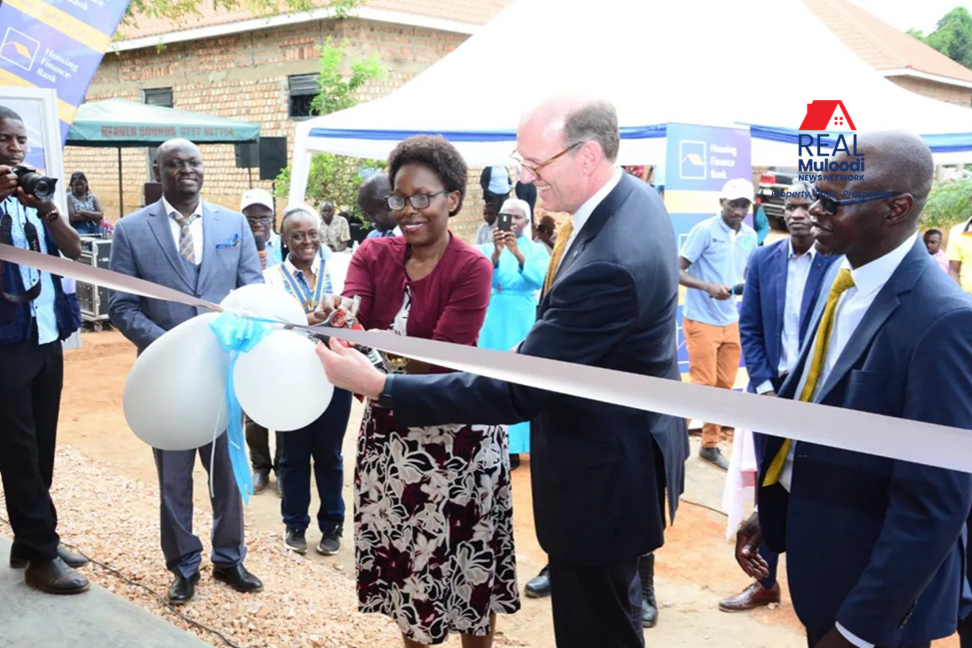UGANDA, Kampala | Real Muloodi News | The government is exploring all possible options to construct low-cost houses for low-income earners, according to Judith Nabakooba, the Minister for Lands, Housing and Urban Development.
Nabakooba announced this at a function where Habitat for Humanity and its partners handed over a house to Kyarisa Home of Hope in Garuga, Entebbe.
She commended the organisation for championing low-cost and environment-friendly houses for their beneficiaries and expressed concern that most property owners construct houses for the rich, which exacerbates the housing deficit.
The government is consulting with stakeholders to establish low-cost houses for low-income earners and the vulnerable, with all facilities in place.
Nabakooba thanked Habitat for Humanity for being practical and helping people through such initiatives.
She promised to break the bureaucratic tendencies and tedious processes involved in drawing and approving house plans that scare people away from constructing houses that are not on the plan.
“As government, we are doing consultation with stakeholders, geared towards establishing low cost houses for low income earners and the vulnerable with all the facilities being in place. I thank Habitat For Humanity for being practical and helping people through such initiatives,” she said.
Nabakooba pledged to design simple plans that will be distributed at the district level to enable low-income earners to construct houses with plans.
Houses built by Habitat for Humanity are constructed with modern and environmentally friendly materials at a pocket-friendly rate, supporting people to thrive and saving the environment from the dangers of materials used for construction.
The organisation’s CEO, Jonathan Reckford, travelled from Atlanta to grace the occasion, and Morris Makoloo, the Vice President of the Africa Region for Habitat for Humanity, expressed gratitude to partners for their support.
“When we serve others, we receive more than we are ready to give. My prayer is that this project can expand and accommodate more underprivileged children. I thank the sisters and partners for this service,” he said.
According to Habitat for Humanity Uganda, a two-bedroom affordable house in an urban area costs approximately USh35m or US$9,000, not including the cost of land, while in a not-so-urban area, the cost is USh25m.
The houses are constructed with the most modern, energy-efficient, and environmentally friendly materials.
They come with improved sanitary facilities, solar power systems, and water harvesting systems to help protect the environment and enable low-income earners to thrive.
The government is committed to giving property owners technical support and putting in place legal frameworks to aid operations to benefit citizens.
The ministry is working relentlessly to ensure that plans are approved on time and to come up with prototype plans to be distributed to all districts for people who cannot afford to draw their own.
“The ministry is working relentlessly to ensure that plans are approved on time. We also want to come up with proto type plans and distribute them to all districts for people who cannot afford to draw their own. Most people in the plan drawing and approval chain ask for a lot of money and we are working towards changing this,” she says.
The government hopes that these initiatives will help to reduce the housing deficit and support low-income earners in accessing affordable housing.
The government’s efforts to construct houses for low-income earners are a step in the right direction, and Habitat for Humanity’s support and expertise in constructing affordable and environmentally friendly homes are commendable.
The implementation of simple plans and legal frameworks to aid operations will help to reduce the bureaucratic tendencies and tedious processes involved in drawing and approving house plans.
With the continued support of the government, stakeholders, and partners, low-income earners will have access to affordable housing and be able to thrive in safe and secure homes.
READ MORE LIKE THIS:
Over 60 Elderly People get Free Houses from Habitat for Humanity
Housing Equality or Real Estate Investment: You Can’t Have Both



